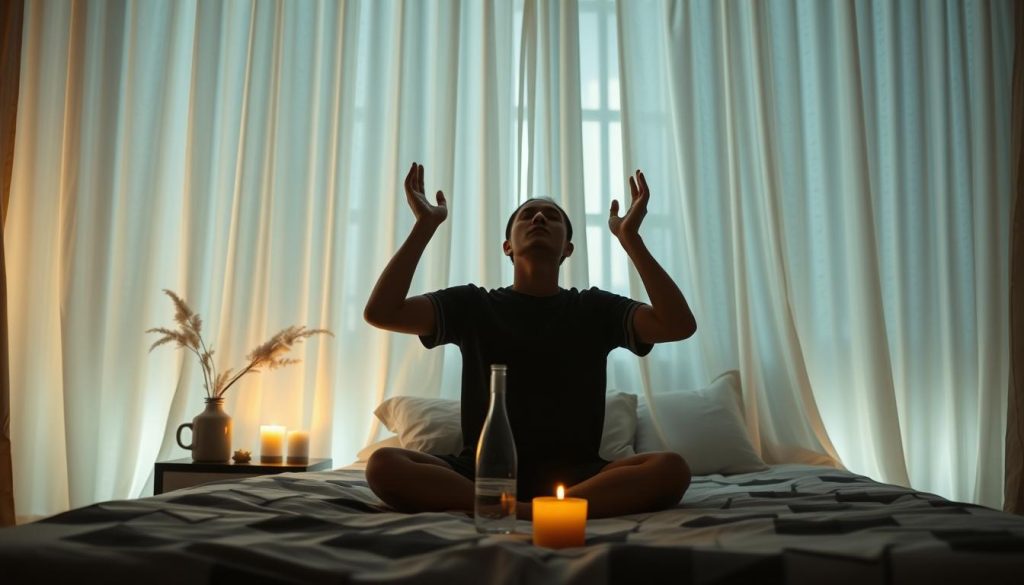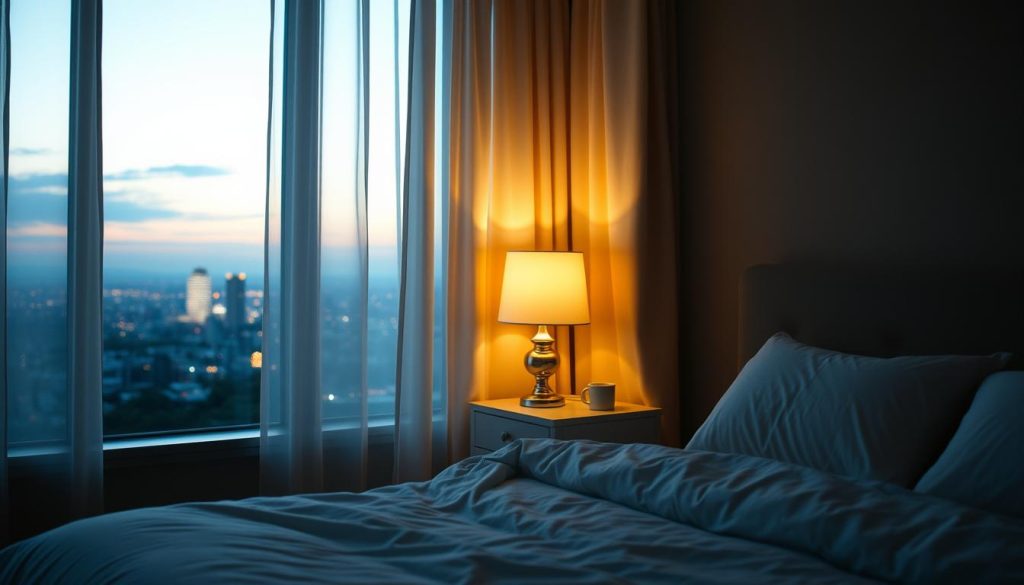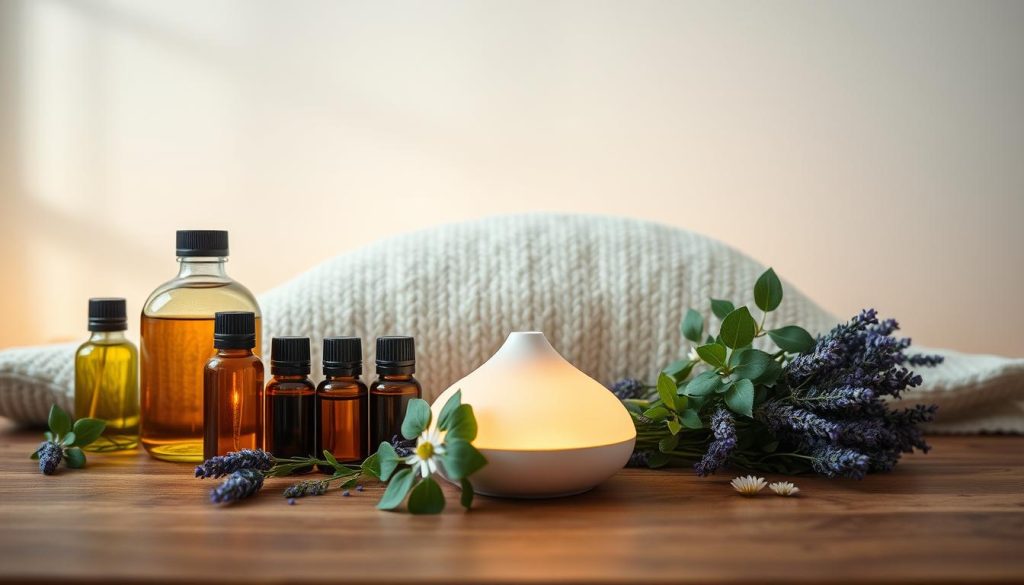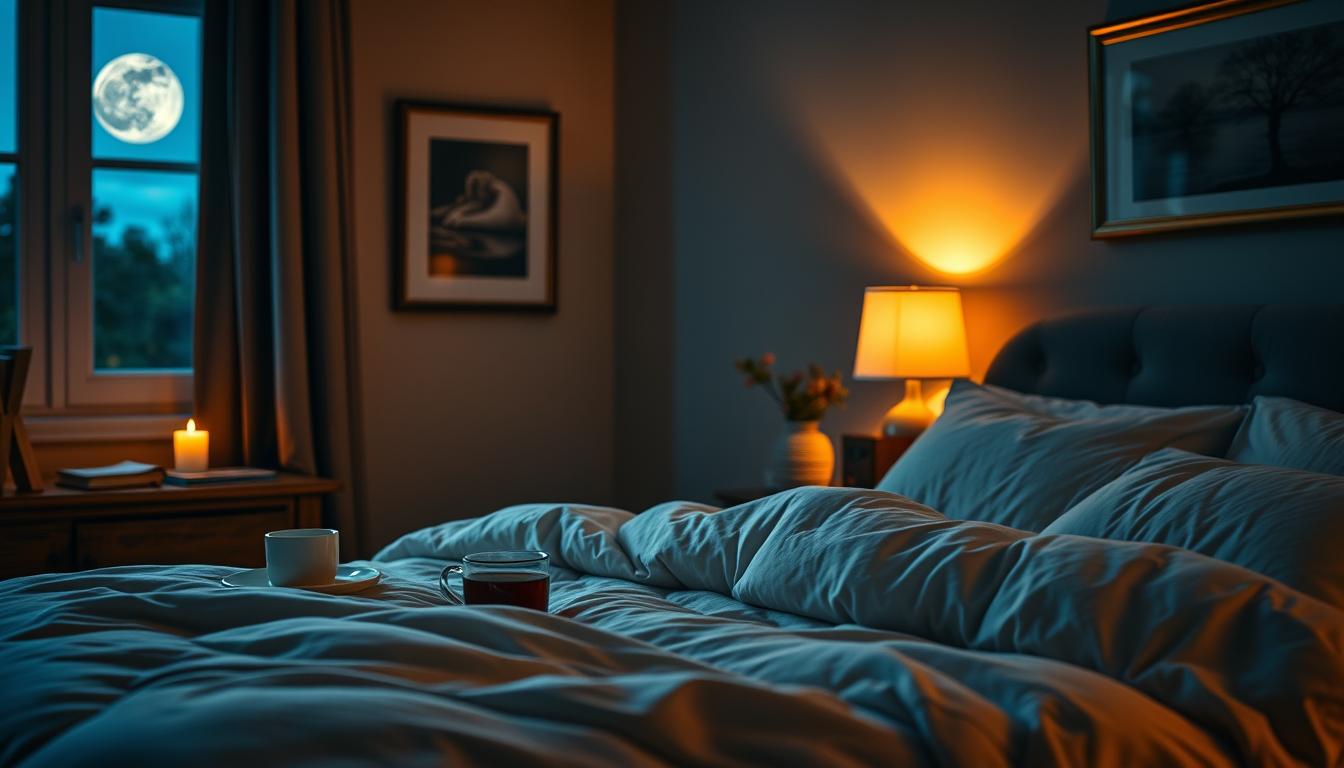Creating a consistent nighttime routine can change your life. It boosts your well-being and makes you more productive during the day. The National Sleep Foundation says a good evening routine helps you relax and tells your body it’s time to sleep.
Studies from Sleep Medicine Reviews and Harvard Medical School show its benefits. They prove how important these habits are for your health. Start a nighttime routine today and enjoy better sleep.
The Importance of a Nighttime Routine
Having a nighttime routine is key for good sleep. It tells your body it’s time to relax and get ready for bed. The National Sleep Foundation says a bedtime routine helps you sleep better by making going to bed feel natural.
Studies in the Sleep Health Journal show that a regular routine improves sleep quality. It makes sleep more restful and helps you wake up feeling refreshed. It also helps with sleep problems like insomnia by making bedtime feel more predictable and calming.
To create a bedtime routine, start with small, calming activities. Reading, taking a warm bath, or doing some gentle stretches can help you relax. These actions signal to your body that it’s time to sleep.
In short, a bedtime routine is a smart way to improve your sleep and fight sleep disorders. By setting aside time each night to unwind, you help your body and mind get ready for a good night’s sleep.
How Bedtime Habits Impact Sleep Quality
Knowing how our bedtime habits affect sleep is key for our health. The right habits can make our sleep longer and deeper.
Maintaining Consistency
Keeping a regular sleep schedule is crucial. The Sleep Foundation says going to bed and waking up at the same time every day helps our body’s clock. The American Academy of Sleep Medicine also stresses its importance for health.
Being consistent tells our body when it’s time to sleep. This makes falling asleep easier.
Limiting Screen Time
Reducing blue light from screens is vital for good sleep. Harvard Health notes that blue light can stop melatonin production, making it tough to sleep. Sleep Medicine Reviews also says cutting down on screen time before bed improves sleep.
Using strategies to reduce screen time in the evening can help us sleep better.
Creating a Calming Bedtime Routine
Adding calming activities to your bedtime routine can greatly improve your sleep. Doing things like reading a favorite book or taking a warm bath tells your body it’s time to relax. The Sleep Foundation says these activities help reduce stress and get you ready for sleep.
Having a nightly self-care routine is key to good sleep. Try gentle stretching, for example. These activities not only relax you but also boost your overall health. A study in the Journal of Clinical Sleep Medicine shows they make your sleep better and longer.
Here’s a table comparing different bedtime relaxation techniques:
| Activity | Benefits | Duration |
|---|---|---|
| Reading | Reduces stress and encourages relaxation | 20-30 minutes |
| Warm Bath | Relaxes muscles and lowers body temperature | 15-20 minutes |
| Gentle Stretching | Improves blood flow and reduces tension | 10-15 minutes |
Adding these activities to your bedtime routine can really help you relax before sleep. The important thing is to do them regularly to get the best sleep.
Sleep Hygiene Tips for a More Restful Night
To get a better night’s sleep, start with good sleep hygiene. This means creating a calm sleep space and using mindfulness. These steps can help you sleep better.
Optimizing Your Sleep Environment
Improving your sleep space is crucial. Keep your bedroom cool and dark. Blackout curtains help block out light. White noise machines or earplugs can also reduce outside noise.
Mindfulness and Relaxation Techniques
Mindfulness can greatly improve your sleep. Try progressive muscle relaxation and guided imagery. These methods relax your body and mind, making it easier to fall asleep.
| Technique | Purpose | Benefits |
|---|---|---|
| Temperature Control | Optimizes comfort | Promotes deeper sleep |
| Blackout Curtains | Blocks light | Creates a dark, calming environment |
| Progressive Muscle Relaxation | Releases physical tension | Reduces stress and anxiety |
| Guided Imagery | Eases the mind | Promotes relaxation |
Evening Rituals for Improved Sleep
Creating evening rituals can greatly improve your sleep. Activities like gentle stretches or herbal tea can calm you down. These habits help reduce stress and make it easier to fall asleep.
A study in Sleep Medicine Reviews found that light stretching relaxes muscles. It helps your body and mind relax before bed. Herbal teas, like chamomile or lavender, also calm the brain, leading to better sleep.
Research in the Journal of Behavioral Medicine shows that evening rituals can help your body adjust to sleep. Adding these activities to your routine can make your sleep more refreshing. It helps you fall asleep faster and sleep longer.
Winding Down Before Bed
It’s important to wind down before bed to get better sleep. The American Academy of Sleep Medicine says a calm routine before sleep boosts sleep quality. Try reading, taking a warm bath, or doing deep breathing exercises. These activities help your body and mind get ready for sleep.
Experts from the Sleep Health Journal suggest a consistent routine. Spend at least 30 minutes before bed relaxing. Listening to soft music or doing gentle stretches can help you relax.

Stay away from things that might keep you awake. Cut down on screen time and avoid hard workouts before bed. Choose calming activities that help make melatonin, improving your sleep.
If you have nighttime anxiety, try mindfulness or meditation. These calm your mind and reduce stress, making it easier to sleep. Following these steps will help you sleep better and wake up refreshed.
Nighttime Routine for Better Sleep
Creating a good nighttime routine means focusing on what you eat and when you sleep. Your diet and bedtime habits greatly affect how well you sleep.
The Role of Nutrition
What you eat can really impact your sleep. Eating foods that help you relax can signal your body to get ready for bed. Foods like turkey and yogurt are good because they have tryptophan.
Also, foods with magnesium and melatonin, like nuts and cherries, are great. But, avoid caffeine and alcohol before bed. They can mess up your sleep.
Establishing a Set Bedtime
Having a fixed sleep schedule is key to syncing with your body’s natural rhythms. Sleeping and waking up at the same time every day improves your sleep quality. This routine helps your body get into a rhythm, making it easier to sleep well.
The Sleep Foundation says keeping a routine, even on weekends, helps avoid sleep problems. It’s all about consistency.
Establishing a Nighttime Routine That Works for You
Creating a sleep routine that fits you means knowing what you need. The Sleep Foundation says it’s key to find sleep patterns that match your life. This makes your bedtime routine both good and lasting.
Everyone sleeps differently, and finding the right routine can improve your rest and work. Experts suggest looking at your evening habits. Change them to fit your life and help you relax and get ready for sleep.
Here are important things to think about when making a sleep routine:
- Consistent bedtime: Stick to a set bedtime that aligns with your natural sleep cycle.
- Relaxing activities: Incorporate relaxing pre-sleep activities such as reading or meditation.
- Environment: Ensure your sleep environment is conducive to rest, focusing on comfort and minimal disruptions.
By using these strategies, you can make your routine better. This helps you meet your sleep needs, leading to better nights and days.
Transitioning from Day to Night
Switching from daytime to nighttime is key for better sleep. You need to create a calm environment and habits that help your body relax.
Gradually Dimming Lights
Dimming lights slowly tells your body it’s time to sleep. It’s like watching the sunset, which helps set your internal clock. Sleep Health says less light in the evening boosts melatonin, the sleep hormone.
Start dimming lights an hour before bed. Move from bright to soft, warm lights. Studies show this helps you get ready for sleep, leading to a better night.

Avoiding Stimulating Activities
It’s also important to avoid things that keep you awake. The National Sleep Foundation warns against intense exercise, heated talks, or exciting TV near bedtime.
Choose calm activities like reading, a warm bath, or gentle yoga. These lower stress and prepare you for sleep.
Using these methods, you can smoothly move from day to night. This improves your sleep and overall health.
Balancing Activity and Rest
Finding the right mix of daily activities and rest is key to good sleep. Knowing how to balance activity and rest can greatly improve sleep quality. Studies in Sleep Medicine Reviews and the American Journal of Lifestyle Medicine show that daytime physical activities greatly affect sleep.
Doing moderate physical activities during the day can help you fall asleep faster and sleep better. But, it’s important to find the right balance. Doing too much intense exercise before bed can make it hard to fall asleep, upsetting your rest and activity cycle.
A smart way to balance daily activities and sleep is to promote a healthier rest cycle. This improves overall sleep balance. Here’s how different activity levels affect sleep:
| Activity Level | Impact on Sleep Quality |
|---|---|
| Low | May lead to less deep sleep |
| Moderate | Promotes longer sleep duration and better sleep efficiency |
| High (Evening) | Potential increase in sleep onset latency |
It’s clear that a balanced activity-rest cycle is crucial for great sleep. By understanding how daily activities affect sleep, you can adjust your routine for a better night’s rest.
Incorporating Gentle Exercise
Adding gentle exercise to your bedtime routine can boost your sleep quality. It’s key to find the right mix of activity and rest. This helps get your body and mind ready for a good night’s sleep.
Stretching Routines
Stretching before bed is a great way to ease muscle tension and relax. Studies show that gentle stretches can loosen tight muscles and calm the mind. This makes it easier to fall asleep.
The Sleep Foundation recommends certain stretches. These include hamstring, neck, and cat-cow stretches. They help reduce stress and make you feel more relaxed.
Here’s a table with some stretches and their benefits:
| Stretch | Benefits |
|---|---|
| Hamstring Stretch | Relieves lower back tension and improves flexibility |
| Neck Stretches | Reduces neck tension and promotes relaxation |
| Cat-Cow Stretch | Relieves spine tension and improves circulation |
Light Yoga Practices
Light yoga is also great for unwinding before bed. Studies show it can calm the nervous system and lower stress. It helps prepare your mind for sleep.
Harvard Health Publishing suggests poses like child’s pose, legs-up-the-wall, and forward bend. These can help you feel calm and ready for sleep.
By using gentle exercises like stretching and light yoga, you can sleep better. These techniques help you relax and enjoy a deeper, more restful sleep.
Using Aromatherapy for Better Sleep
Many people use aromatherapy to relax and improve their sleep. Essential oils like lavender help calm the mind and make it easier to fall asleep. Studies show that lavender oil can really help with sleep quality.
Other scents, like chamomile and sandalwood, also improve sleep. These oils not only make you sleepy but also create a peaceful environment for rest.

Adding aromatherapy to your bedtime routine can be very helpful. It’s important to know which scents work best. Here’s a look at some popular essential oils for sleep:
| Essential Oil | Primary Benefit | Usage Method |
|---|---|---|
| Lavender | Promotes relaxation and improves sleep quality | Diffuse in bedroom, add to bath, or apply to pillow |
| Chamomile | Calms the mind and helps in falling asleep | Diffuse or apply to pulse points |
| Sandalwood | Reduces anxiety and promotes deeper sleep | Diffuse or use in massage oil |
Using these essential oils in your bedtime routine can make a big difference. They help you relax and sleep better, leading to more restful nights.
Tracking Your Sleep to Optimize Your Routine
Improving sleep starts with knowing your current habits. Use wearables like Fitbit or sleep apps to track your sleep. They show how well you sleep and any night-time wake-ups.
Keeping a sleep diary is also helpful. Write down when you go to bed and wake up, and any times you wake during the night. Studies say this helps you understand your sleep better and make changes to sleep better.
Using sleep tracking tools regularly helps you see what needs to change. For example, if you wake up a lot, try making your bedroom better or change your evening routine. This way, you can sleep better and feel healthier.

